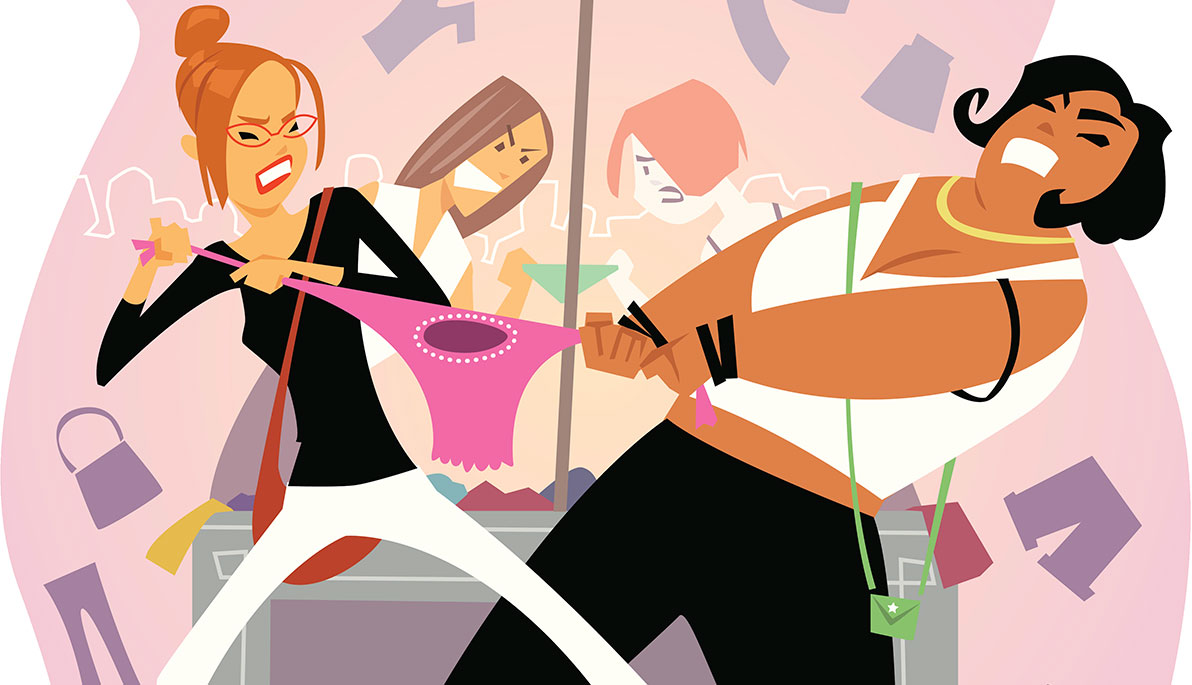
Held for Customer: The Psychology of “Ownership”
January 10, 2018
In the Friends episode “The One with the Cheap Wedding Dress,” Monica Geller literally wrestles with a woman in a bridal store over a gown that each claims is rightfully theirs. The thing is, neither of the women has paid for the dress. The phenomenon, called psychological ownership, isn’t uncommon: shoppers feel ownership of “that perfect something” before buying it, especially when they have tried it on or put it in a shopping cart.
Now, new research from NYIT School of Management Assistant Professor Colleen P. Kirk, D.P.S., and colleagues at University of Wisconsin-Madison and Clemson University provides further insight into consumers’ feelings of infringement (i.e., that someone has encroached on your rights as an “owner”) and the territorial behavior that may ensue as a result of psychological ownership.
In “Property Lines in the Mind: Consumers’ Psychological Ownership and Their Territorial Responses,” published in the Journal of Consumer Research, Kirk and her fellow researchers describe a series of studies that show when and how consumers become territorial about “their” property. As part of their research, the team crafted five experiments, with goals including the following:
- To elicit or manipulate feelings of ownership in consumers.
- To see whether consumers perceive that other people signal their psychological ownership of a product by communicating their knowledge of a product, their ability to control the product, or their investment of themselves in a product.
- To determine whether those same consumers feel infringed if they sense their own communications of “ownership” have been ignored.
Spoiler alert: The answer to the last two questions was a resounding yes.
As it turns out, consumers can feel infringed in countless scenarios regardless of the type of product or location. (The team looked at everything from cafés and clothing stores to open air markets, businesses, and nonprofit organizations.) And it’s not just consumers who feel the effects of psychological ownership. The territorial behaviors that result from feelings of infringement can impact businesses as well: customers may not tip, may leave the store without buying something, or may display other forms of retaliation.
To document this behavior, Kirk and her colleagues invited volunteers or paid participants to take part in scenarios where the researchers could manipulate their psychological ownership. Then, the team observed and recorded participants’ resulting behaviors and responses.
In one experiment, study participants in a café setting witnessed a server moving their cup of customized coffee for no apparent reason, while other participants’ cups were not moved. Not only were the infringed customers put off by the server’s actions, but they also retaliated. The more infringed the customer felt, the less they tipped the server, and the more likely they were to leave the café quickly, or to return less often.
In another experiment, study participants imagined shopping in a retail store for a sweater. The research team documented each shopper’s reaction when another customer, dubbed an “infringer,” either touched the sweater or asked permission to touch it. Asking permission helped—the act dampened the shoppers’ feelings of infringement and reduced territorial responses. Consumers who did feel infringed, however, exhibited territorial responses: some were more likely to pick up the sweater and hold it, while others reported they would make hostile expressions at the infringer. And the territorial behavior went beyond sweaters. When participants were told that the infringer accidentally dropped money on the ground, infringed shoppers were less likely to bother to point out the mistake.
The research team found that consumers were likely to perceive that another individual was claiming psychological ownership of a product via one of three ways: when the other person attempted to control the product, such as by touching it; when they claimed an attachment to it, such as by creating a similar design; or by claiming expertise in it.
“Marketers need to be aware of these issues, because their actions and words might unknowingly elicit negative feelings associated with infringement,” said Kirk. To help avoid awkward situations, Kirk says that marketers should provide ways for consumers to protect their psychologically-owned items prior to purchase. At a grocery store, a separator bar, no matter how flimsy, helps shoppers feel “their” items are separate from someone else’s. Other stores, she said, could offer shoppers bags in which to hold the items they are considering.
Ironically, even Kirk has been known to fall prey to psychological ownership. “Even my adult son felt infringed recently when he was telling me about a new product discovery he had made. I was unintentionally claiming ownership by telling him special details about the product that I already knew,” she said. “This research has helped me not only in understanding territoriality and its implications in consumer behavior, but also to be more sensitive about when I might inadvertently be communicating feelings of ownership and eliciting territorial responses in others.”
More Features

An Alumnus’ Commitment to the Environment
As an energy management graduate from New York Tech’s Vancouver campus, Jasdeep Gulati (M.S. ’22) is highly invested in educating people about environmental and climate sustainability.

Vancouver Faculty Win University-Sponsored Research Awards in New Program
The new Global Impact Research Grant (GIRG) program has been developed to keep Vancouver-based faculty connected to faculty and research projects being conducted on the university’s New York campuses.

Studying Climate Change One Degree at a Time
Junhua Qu (M.S. ’24) began her collegiate journey in Beijing. But, her interest in climate change took her to New York Tech’s Vancouver campus to study energy management.
